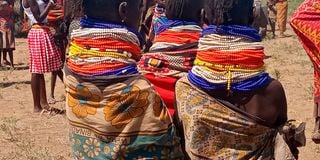Turkana South families marry off girls to get bride wealth but remain poor

Beaded girls attend a traditional wedding in Nanaam village, Turkana West. Turkana South sub-county education officer Jared Atsiaya says beading girls promotes child marriages.
What you need to know:
- Besides child marriages, there is an escalation of early pregnancies in major towns where men dupe girls with money and gifts, then impregnate and leave them on their own devices.
- Turkana County had mounted a serious awareness campaign to inform schools and the community of child health, education rights, and menstrual hygiene.
Education stakeholders in Turkana County have linked child marriages to high poverty levels in families, especially in remote areas.
Turkana South education officer Jared Atsiaya said retrogressive culture of beading girls only for them to be married off to men with large herds of livestock is a major contributor to poverty.
“Beading girls to attract suitors with large herds of livestock promotes child marriages, deprives girls of their dignity and denies them their constitutional right to education that can assure them of a successful future,” he said.
Mr Atsiaya said that besides child marriages, there is an escalation of early pregnancies in major towns where men dupe girls with money and gifts, then impregnate and leave them to their own devices.
In effort to reduce pregnancies among schoolgirls, the Kenyan Chapter of the Forum for African Women Educationalists (Fawek) is supporting Turkana County to empower boys and men to support vulnerable girls.
The strategy, executed through a Fawek-led programme popularly known as Imarisha Msichana, seeks to promote the re-entry of affected girls in school, hence giving them a second chance at life.
The 2022 data from the Kenya Demographic and Health Survey (KDHS) indicates that the prevalence of teenage pregnancy in Turkana is 19 per cent. This is higher than the national average of 15 per cent, calling for concerted efforts from sector players to save the girls from this unfortunate vulnerability.
Speaking after a two-day men’s conference in Lodwar, Fawek county coordinator Alfred Juma said males engaged in critical roles that interact with the lives of girls and would promote awareness of the dangers associated with early pregnancy and the need to reconnect affected girls with educational opportunities.
“When schoolboys, boda boda operators, school patrons, and community champions are thoroughly informed and meaningfully engaged, it becomes possible to protect the girls and improve school re-entry rates,” Mr Juma said.
Noting that the programme had succeeded in facilitating the re-entry of up to 195 girls who had dropped out of school because of teenage pregnancy, Juma lauded the national and county governments for creating an enabling environment for success.
Head of school health programme Rael Akoru said that the county had mounted a serious awareness campaign to inform schools and the community of child health, education rights, and menstrual hygiene.
She said many girls were at risk of early pregnancy and dropping out of school because of period shame, and called on the attendees to assist the girls during their menses. “I am impressed that Fawek has innovatively integrated access to menstrual health materials by capacity building and equipping girls with skills for manufacturing reusable sanitary pads,” Ms Akoru stated.
Lilian Ekamais, the wife of Governor Jeremiah Lomorukai, separately said the women leaders have rolled out a campaign to not only increase enrolment and retention of girls in schools but also ensure the perpetrators face the full force of the law.
“We should not allow the patriarchal nature of our society, where women don't have a say in leadership and our voices are not valued, to let our girls' rights be violated. The few women with leadership positions and those who are enlightened on constitutional rights of our children should unite and say no to child marriages,” Ms Ekamais said.

Lilian Ekamais, the wife of Governor Jeremiah Lomorukai, says women leaders have rolled out a campaign to not only increase enrolment and retention of girls in schools but also ensure the perpetrators face the full force of the law.
She said they have realised that schools provide a safe haven for the children, who, at the end of their studies, will have a bright future.
“Harmful cultural practices have always been exacerbated by poverty and prolonged drought. Families that have lost their livestock, their only source of livelihood in remote areas, are marrying off their girls to rich and old men with large herds of livestock to survive,” she regretted.
She called on education and security officials to join hands and ensure chiefs who abet harmful practices are also arrested.
Turkana Woman Representative Cecilia Ngitit called on development partners to support governments by mapping areas where child marriages are rampant and establish safe spaces to rescue the girls.
She said because of poverty, bride wealth is a safety net for poor families who have no source of livelihood besides unreliable relief food supplies.

Turkana Woman representative Cecilia Ngitit in Lodwar town. She called on development partners to support the county to establish safe spaces in areas where child marriages are rampant to rescue girls.
“It is sad to learn that elders with large numbers of livestock target their poor and illiterate peers whose desperation and vulnerability automatically facilitate marriage of girls as young as 12.”
She explained that such young girls, despite being married off to polygamous men old enough to be their grandfathers, are mostly widowed a few years later. The representative said they have established that a man with more than four beaded girls is considered rich overnight on the day he gets suitors, a culture that should not be tolerated.





